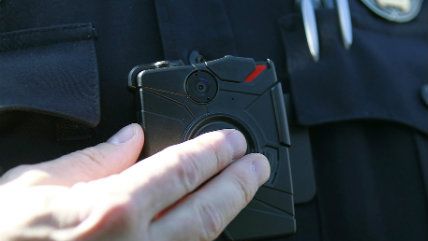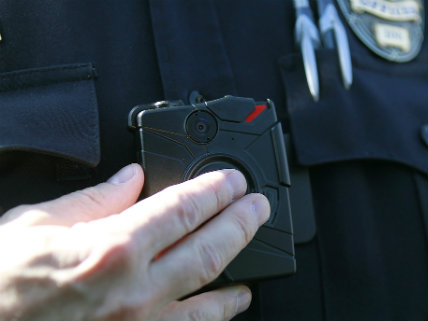Inside the Bitter Lobbying War Over Police Body Cam Contracts
New York City's $6 million contract for police body cams reveals a fierce PR battle between two companies to sway city officials, the public, and the media.


Last Friday, the New York Police Department awarded a $6 million contract for its long-delayed body cam program. It was a cause for measured celebration among the civil rights advocates who have complained about the NYPD's interminable rollout of body cams, but in at least one corner of town, it was a bitter defeat.
The NYPD contract was awarded to VieVu, one of the two dominant body cam manufacturers in the U.S. VieVu's main competitor is Taser International, whose stock price tumbled 12 percent on Friday on the news that it had been passed over for the contract. While Taser is famous for making stun-guns, it bet several years ago—correctly, it appears—that most police departments would someday soon be equipped with body-worn cameras. Since then, Taser and VieVu have duked it out in city after city, vying for lucrative public contracts for police body cams.
For example, the East Bay Express revealed last December that Taser had hired a well-connected lobbyist in Oakland to muscle in on VieVu's contract. The lobbyist set up meetings between city councilors and Taser officials to demo the company's products. The Wall Street Journal also obtained emails revealing that Taser "coached local officials on how to avoid common bidding procedures, allowing it to secure lucrative contracts without facing competition."
So I was less than surprised when a staffer from New York-based communications and lobbying firm Scheinkopf emailed me out of the blue last week and offered to pass along a handy fact-sheet detailing the ways in which VieVu's body cams were deficient, and to put me in touch with New York City Councilman Robert Cornegy for an interview.
Over the phone Friday, Cornegy told me he had "tremendous concerns" with VieVu's history of performance in other cities. For example, the Oakland Police Department revealed in August that it had accidentally deleted a quarter of all its stored body cam footage while updating its VieVu software.
A Cincinnati Police Department product testing report from earlier this year provided by Scheinkopf also found that VieVu's body cams had a more limited field of view, lower resolution, worse audio quality, and more docking problems compared to Taser's. Cincinnati ultimately awarded the contract to Taser, finding that "TASER's BWC hardware and software systems were clearly the most advantageous option."
"I'm not sure why we'd choose to enter into contract with a product that, at the least, is subpar and, at worst, defective," Cornegy said. He also said the New York City Council's influential Black, Latino, and Asian Caucus was considering drafting a letter in opposition to the contract.
When I asked Cornegy if he'd had any meetings with Taser representatives, he said he hadn't, because that would have been inappropriate.
I also verified with the Cincinnati Police Department that the product testing report was real, but I didn't know for certain whether it had been provided as part of a concerted PR push by Taser, shielded as it was by layers of lobbyists and public relations firms.
I was, of course, not the only reporter that Cornegy and Scheinkopf had reached out to—he gave interviews to The New York Post and New York Observer, both of which cited the Oakland and Cincinnati issues—nor was I the only one who had caught the unmistakable whiff of money behind the story. Politico New York, doing some admirable sleuthing, reported Thursday morning:
One of the documents shared by Cornegy—a report written by the Cincinnati Police Department which outlines concerns with the Vievu cameras—lists the document's owner as "IFields," which seems to refer to Isaiah Fields, the Vice President of Associate General Counsel at Taser International.
Another document shared with POLITICO New York by Cornegy—a Microsoft Word document with detailed information about VieVu's performance—showed in its metadata that the document was last saved by Patrick Jenkins, the well-known political operative and consultant who runs his own strategic communications and lobbying firm.
Jenkins, reached by POLITICO New York, confirmed he had indeed been hired, last week, by Taser International, on a $15,000 per month contract.
A spokesperson for Cornegy initially said the information the councilman received and shared with POLITICO New York did not come directly from Taser International.
"The information came from a consultant in the industry who asked not to be disclosed. All of the information was pulled from public records, however, including the Cincinnati report," said Alina Agusti, an associate for the communications and lobbying firm Sheinkopf, who was working on behalf of Cornegy.
VieVu has lobbied up as well. According to state records, the company retained Mercury Public Affairs to lobby the New York City Council's public safety committee on body cameras.
As I wrote in The Daily Beast last year, the rapid rollout of body-cam technology has outpaced policy and best practices surrounding their use. It has also opened up large pots of public money for companies to fight over behind the scenes, with little accountability. It appears to be an open question whether the public is getting the best product or the best propaganda.
NYPD officials told reporters on Monday that it had investigated VieVu's issues in other cities and was satisfied with the fixes the company had put in place since then.
Aiden Woglom, a spokesman for VieVu's parent company, Safariland, said in a statement to Reason that the company's products "are vital to today's policing efforts and we are honored to play an important role in maintaining public safety."
"If VIEVU has been the target of an unwarranted smear campaign, we will pursue all available legal remedies to protect our rights and business," Woglam said, "including potentially filing a claim of tortious interference against those responsible."
Taser International did not immediately respond to requests for comment.
Editor's Note: As of February 29, 2024, commenting privileges on reason.com posts are limited to Reason Plus subscribers. Past commenters are grandfathered in for a temporary period. Subscribe here to preserve your ability to comment. Your Reason Plus subscription also gives you an ad-free version of reason.com, along with full access to the digital edition and archives of Reason magazine. We request that comments be civil and on-topic. We do not moderate or assume any responsibility for comments, which are owned by the readers who post them. Comments do not represent the views of reason.com or Reason Foundation. We reserve the right to delete any comment and ban commenters for any reason at any time. Comments may only be edited within 5 minutes of posting. Report abuses.
Please to post comments


For example, the Oakland Police Department revealed in August that it had accidentally deleted a quarter of all its stored body cam footage while updating its VieVu software.
They were only supposed to be able to accidentally do that when the video evidence was not flattering.
#BlueLiesMatter
Taser is famous for making stun-guns Tasers.
Or, as police prefer to call them, cattle prods.
Or as cattle prefer to call them, authoritongs. /Moooooo
We all know how this will end. VieVu will end up buying Taser, or vice versa, and then spend the majority of its budget lobbying Congress to pass a law to make body cameras mandatory for all police departments.
"A Cincinnati Police Department product testing report from earlier this year provided by Scheinkopf also found that VieVu's body cams had a more limited field of view, lower resolution, worse audio quality, and more docking problems compared to Taser's. "
One man's advantageous camera glitches is another man's lack of conclusive evidence.
I have a nit to pick: best practices are always an evolved phenomenon. You can't really have a set of best practices until you've tried some things and seen what works well and what doesn't. Until you get on the far side of the scale up, you're not going to be able to get together with a bunch of other people doing the same thing and figure out what works and what doesn't.
I would say that the rollout has been accompanies by bad policy. As in, no requirement that they be on constantly, no penalties for not having them on, no requirements that they be made available to complainants, etc.
You say the policy is bad, but you are looking at it from the wrong point of view. The point of the policy is to protect officers and maintain the public trust. Punishing officers for wrongdoing is not only a violation of officer safety, but it undermines the public trust by letting the public see officers behaving badly. If the public never sees officers engaging in criminal activity and never sees them being punished for it, then they are more likely to trust the police. Government can't function without the public trust. That is why governments hide things from the public. If the public knew what was really going on, then that trust would completely break down.
Two ticks fighting over a rich vein. Time to just slice that vein and let it bleed out.
I have been told by a police official in SF that getting the data from the SF cameras (pretty sure it's Taser) takes more than 24 hours.
I have a hard time believing that GoPro, for instance, couldn't produce that data ('footage') in seconds of attaching it to a screen.
I'm sure it takes less than a second to get the data from the camera. What takes time is finding someone in the department who will actually to their job, talking with lawyers, getting stories straight, editing out incriminating bits, or breaking the damn thing if the footage really makes the department look bad.
Yeah, good point. Where is GoPro in all this? Are they falling behind? They could have sooo much police footage by now for their cool commercials.
Well, here's the thing.
The guy who pulls the footage is in the union, so that means he, and only he, is allowed to pull footage.
With that in mind, I think 24 hours is actually quite reasonable.